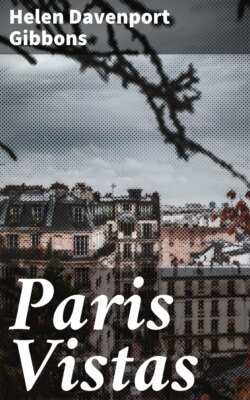Читать книгу Paris Vistas - Helen Davenport Gibbons - Страница 10
На сайте Литреса книга снята с продажи.
CHAPTER III
A HONEYMOON PROMISE
ОглавлениеTable of Contents
WE left Oxford very suddenly. Six weeks in the Bodleian Library, in spite of canoeing every afternoon, sufficed to go through a collection of contemporary pamphlets about the Guises. And then we were getting hungry. Since he never changes the menu, roast beef and roast lamb alternating night after night, and accompanied by naked potatoes and cabbage, must content the Englishman. But all who have not a British birthright either lose their appetites or go wild after a time. We thought that we could not stand another day of seeing that awful two-compartment vegetable dish. It never contained a surprise. You could swear with safety to your soul that when the lid was lifted a definite combination of white and green would meet your eye.
So, when in the early days of July nineteen hundred and eight the London newspapers published telegrams from Constantinople that foreshadowed startling changes in Turkey, we were ready to flit. We had planned to spend our honeymoon winter in Asia Minor, anyway, and thought we might as well get out there as soon as possible. The spirit of adventure is strong in the blood of the twenties and decisions are made without reflection. It is great to be young enough to have a sudden change of plans matter to none, least of all to oneself. On Monday afternoon we were canoeing on the Cherwell, with no other thought than the very pleasant one of doing the same thing on the morrow. The next afternoon we were in a train speeding from Calais to Paris, trying to recuperate from the Channel passage.
Herbert and I both knew Paris. But we did not know Paris together, and that made all the difference in the world. When we reached the Gare du Nord, we were as filled with the joy of the unknown as if we had been entering Timbuktoo. On the train we discussed hotels. A slim pocketbook was the only bank in the world to draw upon for a long journey. On the other side was the less commonsense but more convincing argument, that this was once in our lives, and that if it ever was excusable to do things up right, now was the time. The pocketbook was so slim, however, that until we stepped out into the dazzling lights, we were not altogether sure that it would not be a modest little hotel. We compounded with prudence by hailing a fiacre instead of one of the new auto-taxis, and directed the cocher to take us where we wanted to go.
Looking up the Avenue de l'Opéra
It was the thought of being in the heart of things, right at the Place de l'Opéra, that prompted us to choose the Grand Hotel. The price of rooms was preposterous. We took the cheapest they had on the top floor. The economical choice is sometimes the lucky one. Next time you are in the Place de l'Opéra, look up to the attic of the Grand Hotel, and you will see little balconies between the windows. Each window represents a room. So does each balcony. We drew a balcony. It was just wide enough for two honeymoon chairs; and it was summer time.
When I was waiting in the vestibule of a New York church for the first strains of the wedding march, my brother pressed a five-dollar gold piece inside my white glove. "For a bang-up dinner when you get to London," he whispered. In London we had been entertained by friends. This was the time to spend it. The initiated would open his eyes wide at the thought of the "bang-up" dinner for two for twenty-five francs in Paris today—or anywhere else in the world. But remember I am writing about nineteen hundred and eight. Six years before the war, twenty-five francs would do the trick, and do it well, on the Grands Boulevards. We had fried chicken with peas, salad and fruits rafraîchis at Pousset's, and there was some change after a liberal (ante-bellum!) tip.
After dinner we strolled along the Boulevards des Italiens. We came to a big white place, with a wealth of electric lamps, that spelled PATHE—PALACE. A barker walked up and down in front, wearing a gold-braided cap and a green redingote. We paused as at the circus. It was a cinema. Herbert wanted to go in, but I wasn't sure. I had never seen moving pictures and had heard that they hurt one's eyes. To be a good sport I yielded. It was a revelation to me, and I felt as I did a year or two later when I first saw an aeroplane. My censor and literary critic, who has not the imagination of an Irishman, wants to eliminate this paragraph. But I have refused. It is true that I had never been to the cinema before I married him, and I am not sure that it was not his first time, too. The wonders of one decade are the commonplace of the next, and in retrospect we should not forget this. "Nineteen-eight" was to be the wonder year. Is there not an old Princeton song, still in the book, which was sung with expectation by our fathers? It went something like this:
